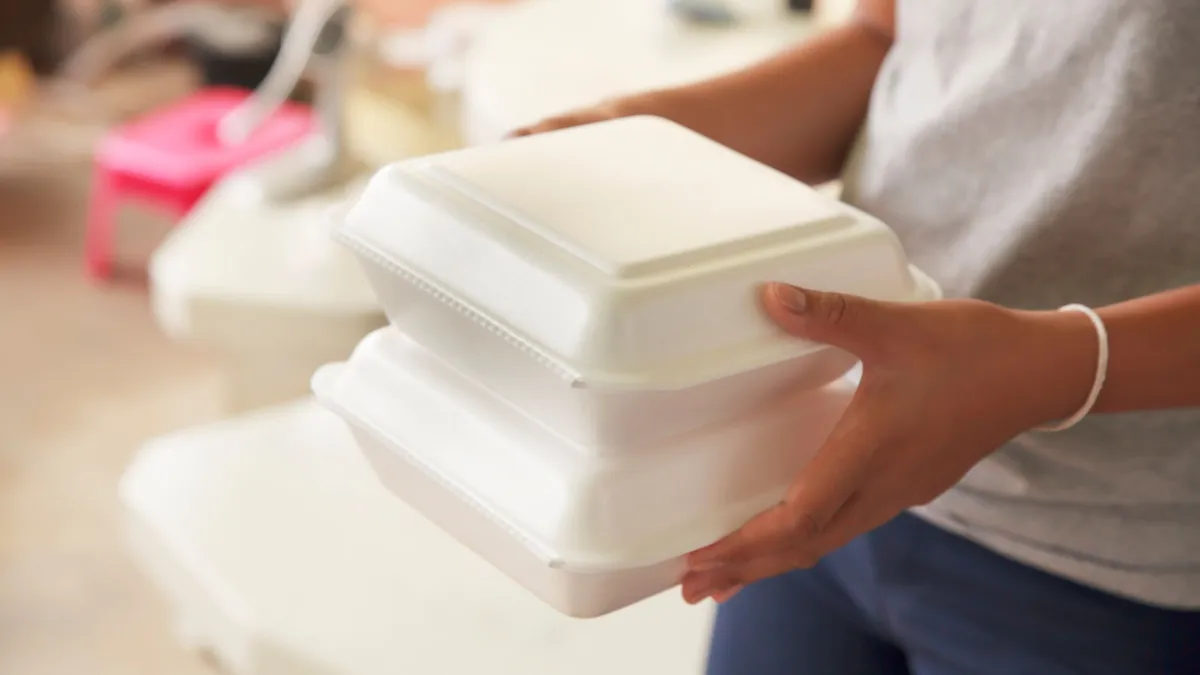CalRecycle started 2025 by releasing multiple reports and updates as it implements SB 54, California’s Plastic Pollution Prevention and Packaging Producer Responsibility Act.
Reducing single-use plastics
CalRecycle released its source reduction baseline report on Dec. 31. Working with consulting firm Accenture, the agency estimated the amount of single-use plastic packaging sold, offered for sale or distributed in the state in 2023. These figures inform how much plastic — both in tonnage and the number of individual pieces — will need to be reduced to hit the 25% decrease by 2032 that’s spelled out in SB 54:
| Single-use plastic model | Total plastic components | Total weight of plastic (tons) |
| Packaging | 84 billion | 2.4 million |
| Food service ware | 87.4 billion | 500,000 |
| Total | 171.4 billion | 2.9 million |
| 25% reduction by 2032 | 42.9 billion | 725,000 |
Updated recyclability, compostability designations for covered material categories
The agency also released an updated version of its covered material categories list, or those materials that will be regulated under SB 54. The list is to be republished annually through 2032.
CalRecycle’s original CMC list released a year ago showed that 37 out of 98 categories — about 38% — were “potentially recyclable” in the state, including most types of glass, aluminum, cardboard, and paper, as well as certain types of plastics. Six categories were denoted as “potentially compostable.”
A July update to covered material categories streamlined the list from 98 to 94 categories.
The latest edition released Dec. 31 had closer to half — 45 of 94 — of the categories considered “recyclable,” while 11 were deemed “compostable.”
One year-over-year change is that additional tin, steel, bimetal and other metal categories are now deemed recyclable; the original list largely viewed aluminum categories as the only recyclable metals. On the compostability side, newly recognized additions include molded fiber without plastic, as well as cardboard and waxed cardboard without plastic.
Restricting plastic foam food service ware
SB 54 stipulated that for producers to continue selling plastic foam food service ware, they would have to prove the material had a 25% recycling rate as of Jan. 1, 2025 — a provision viewed by many as a de facto ban for a material not widely recycled.
CalRecycle’s Melanie Turner, an SB 54 spokesperson, said on Jan. 2 that the agency is currently reviewing EPS recycling rate data received from one unspecified EPS company.
Producers of EPS food service ware may be subject to enforcement, Turner said in an email. CalRecycle may initiate investigations and issue notices of violation. Thirty days after such a notice is issued, noncompliant producers could face penalties of up to $50,000 per violation per day, Turner said.
Turner confirmed that in the updated CMC list, the two expanded polystyrene covered material categories, which include EPS used for single-use food service ware and single-use packaging, do not meet the requirements to be considered recyclable in California. However, Turner clarified that SB 54’s foam provision “is in addition to and not necessarily corresponding to CMC recyclability list criteria.”
In September, CalRecycle reminded EPS producers of the looming 2025 requirement. The recyclability threshold will later rise to 30% in 2028, 50% in 2030 and 65% in 2032. Food ware maker Dart Container blamed impacts from the law when it recently laid off 175 people across two California facilities.
The Ocean Conservancy noted in a press release Thursday that, with California’s deadline, plastic foam food ware faces bans along the entire West Coast. A Washington state ban on plastic foam food ware took effect in 2024, and an Oregon ban also took effect this week. Several other states also have various restrictions on foam containers.
Anja Brandon, director of plastics policy at the Ocean Conservancy, said in a statement that the change in California “will make a huge impact in protecting the ocean, environment, and our communities from this widespread form of plastic pollution.” The nonprofit supports the national Farewell to Foam Act, a bill introduced in Congress in 2023 that did not move. It called for phasing out single-use plastic foam food service products nationwide come 2026.
Interested in more packaging news? Sign up for Packaging Dive’s newsletter today.
















